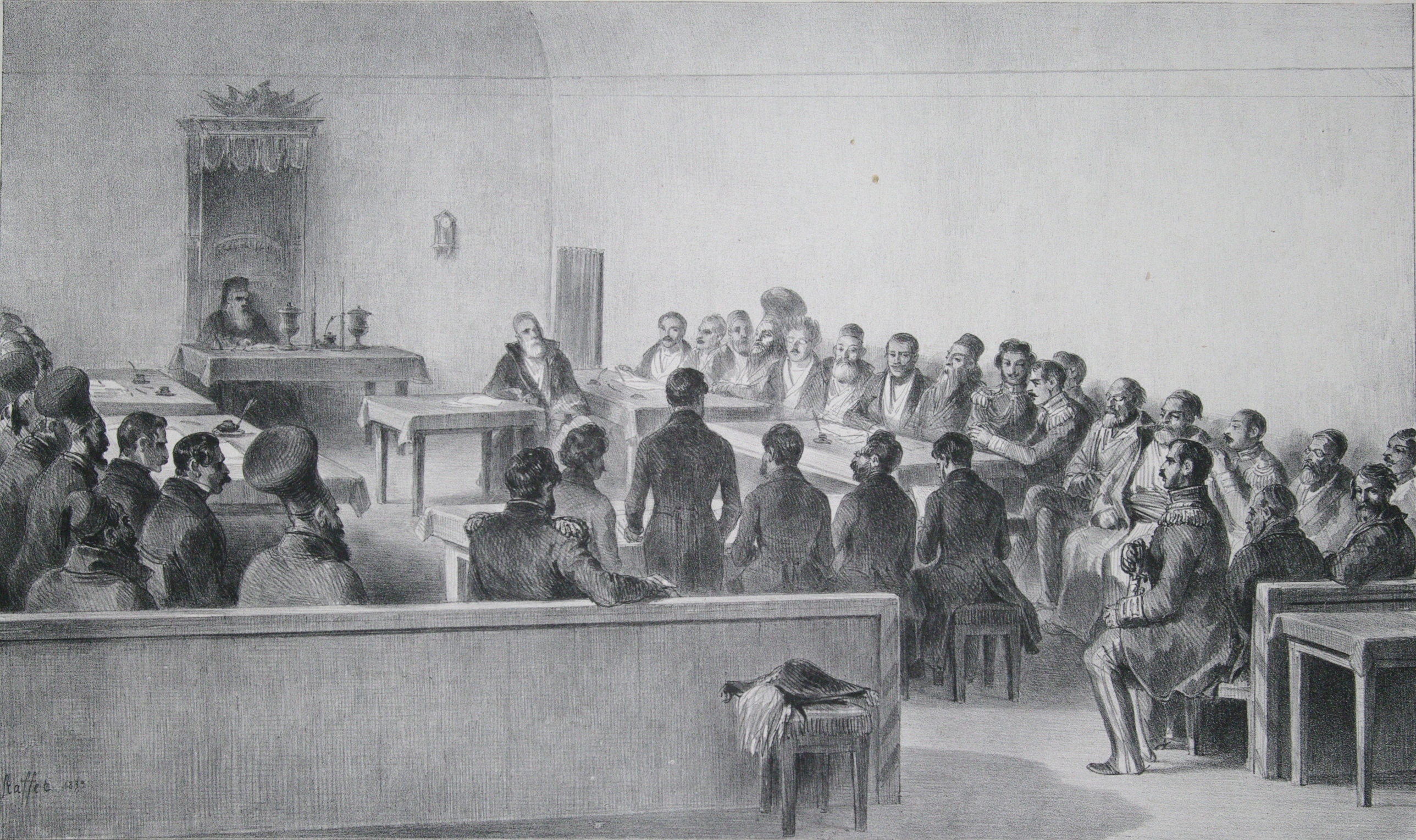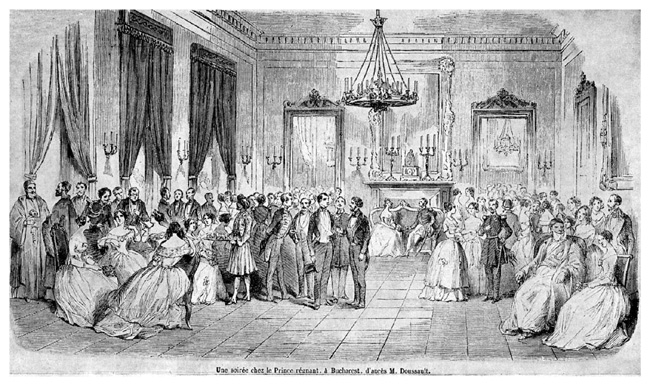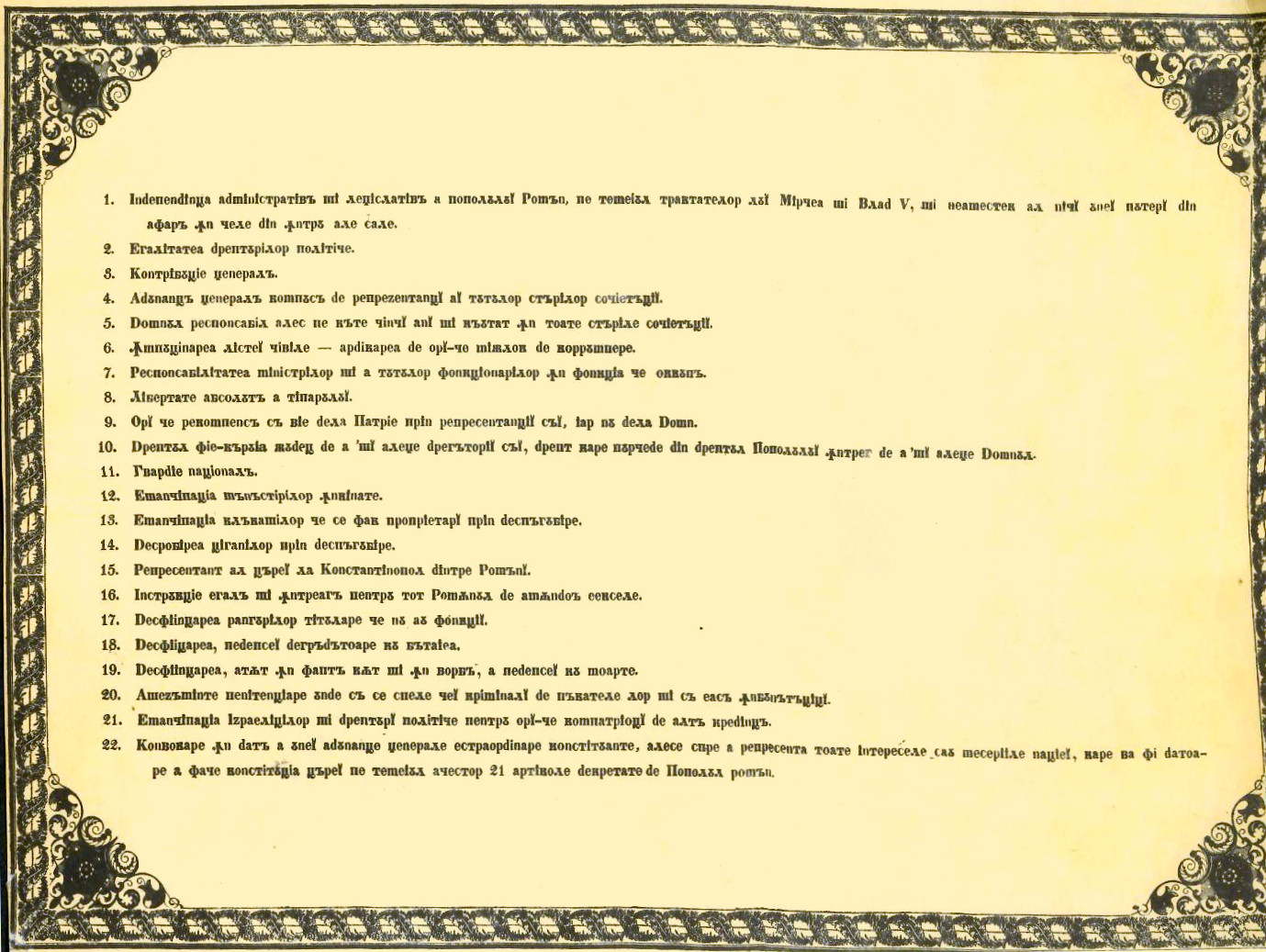Gheorghe Bibescu on:
[Wikipedia]
[Google]
[Amazon]
Gheorghe Bibescu (;April 26th 1804 – 1 June 1873) was a ''
 On 1 January 1843 the first (and only) elections carried out in accordance with the ''
On 1 January 1843 the first (and only) elections carried out in accordance with the ''
 In the spring of 1844, the Wallachian government approved the request of the Russian engineer
In the spring of 1844, the Wallachian government approved the request of the Russian engineer
 In December 1846, he was advised by Kiseleff to call for new Public Assembly elections. The elections brought a new Assembly dominated by politicians loyal to the hospodar. With this legislature, Bibescu passed several important laws, such as a new law on the
In December 1846, he was advised by Kiseleff to call for new Public Assembly elections. The elections brought a new Assembly dominated by politicians loyal to the hospodar. With this legislature, Bibescu passed several important laws, such as a new law on the  In the summer of 1848, the revolution broke out. Initially, Wallachian radicals had unsuccessfully attempted to attract Bibescu to their side. They then issued the ''
In the summer of 1848, the revolution broke out. Initially, Wallachian radicals had unsuccessfully attempted to attract Bibescu to their side. They then issued the ''
"Sub semnul romantismului de la domnitorul Gheorghe Bibescu la scriitorul Simeon Marcovici"
hospodar
Hospodar or gospodar is a term of Slavonic origin, meaning "lord" or " master".
Etymology and Slavic usage
In the Slavonic language, ''hospodar'' is usually applied to the master/owner of a house or other properties and also the head of a family. ...
'' (Prince
A prince is a male ruler (ranked below a king, grand prince, and grand duke) or a male member of a monarch's or former monarch's family. ''Prince'' is also a title of nobility (often highest), often hereditary, in some European states. T ...
) of Wallachia
Wallachia or Walachia (; ro, Țara Românească, lit=The Romanian Land' or 'The Romanian Country, ; archaic: ', Romanian Cyrillic alphabet: ) is a historical and geographical region of Romania. It is situated north of the Lower Danube and s ...
between 1843 and 1848. His rule coincided with the revolutionary tide that culminated in the 1848 Wallachian revolution
The Wallachian Revolution of 1848 was a Romanian liberal and nationalist uprising in the Principality of Wallachia. Part of the Revolutions of 1848, and closely connected with the unsuccessful revolt in the Principality of Moldavia, it sought ...
.
Early political career
Born in Craiova as the first son of Dimitrie Bibescu, a member of the Bibescu boyar family, he studied Law in Paris. After his return to Wallachia, he was elected deputy in the Extraordinary Public Assembly, the legislative forum established by the Imperial Russian overseers at the end of the Russo-Turkish War of 1828–1829, representing theDolj County
Dolj County (; originally meant ''Dol(no)- Jiu'', "lower Jiu", as opposed to '' Gorj'' (''upper Jiu'')) is a county ( județ) of Romania on the border with Bulgaria, in Oltenia, with the capital city at Craiova.
Demographics
In 2011, the c ...
during the Pavel Kiseleff administration. He subsequently took on different offices, including that of secretary of state. Before his election as hospodar, he was seen as an opponent of his predecessor, Alexandru II Ghica
Alexandru Dimitrie Ghica (1 May 1796 – January 1862), a member of the Ghica family, was Prince of Wallachia from April 1834 to 7 October 1842 and later caimacam (regent) from July 1856 to October 1858.
Family
He was son of Demetriu Ghica ...
.
Hospodar of Wallachia
Election
 On 1 January 1843 the first (and only) elections carried out in accordance with the ''
On 1 January 1843 the first (and only) elections carried out in accordance with the ''Organic Statute
An organic law is a law, or system of laws, that form the foundation of a government, corporation or any other organization's body of rules. A constitution is a particular form of organic law for a sovereign state.
By country France
Under Articl ...
'' took place in Wallachia; these were carried out by a representative assembly, and had been prompted by Ghica's abuse.Hitchins, p.212 Of many candidates, Bibescu and his older brother, Barbu Ştirbei, were the most popular choices with Imperial Russia. Bibescu was elected hospodar, supported by both the conservative
Conservatism is a cultural, social, and political philosophy that seeks to promote and to preserve traditional institutions, practices, and values. The central tenets of conservatism may vary in relation to the culture and civilization in ...
boyars and the younger liberals. One of his first gestures in office was to grant pardon to radicals who had conspired against Ghica (including Mitică Filipescu
Mitică () is a fictional character who appears in several sketch stories by Romanian writer Ion Luca Caragiale. The character's name is a common hypocoristic form of ''Dumitru'' or ''Dimitrie'' (Romanian for ''Demetrius''). He is one of the bes ...
and Nicolae Bălcescu
Nicolae Bălcescu () (29 June 181929 November 1852) was a Romanian Wallachian soldier, historian, journalist, and leader of the 1848 Wallachian Revolution.
Early life
Born in Bucharest to a family of low-ranking nobility, he used his mother' ...
).
Bibescu did not change the government immediately after the election, as it was made up mostly of Ghica's political adversaries. However, his relations with the Public Assembly started to deteriorate due to disagreements on several legislative projects.
The Trandafiloff affair and dissolution of the Assembly
 In the spring of 1844, the Wallachian government approved the request of the Russian engineer
In the spring of 1844, the Wallachian government approved the request of the Russian engineer Alexander Trandafiloff
Alexander is a male given name. The most prominent bearer of the name is Alexander the Great, the king of the Ancient Greek kingdom of Macedonia who created one of the largest empires in ancient history.
Variants listed here are Aleksandar, Al ...
, to be allowed to administer the country's mines (which were subject to private ownership). Moreover, if any mine owner did not begin extracting from their mines within 18 months, the Russian company was to take over the administration of the mines for 12 years, by paying 10% of the income to the owner and 10% to the Wallachian state.
Bibescu approved the contract, but the Public Assembly protested against it: the deputies saw it as an intervention of the protecting power
A protecting power is a country that represents another sovereign state in a country where it lacks its own diplomatic representation. It is common for protecting powers to be appointed when two countries break off diplomatic relations with e ...
in local politics. The contract was eventually cancelled, but, caught between the Assembly's position and the Russian authorities, on 4 March 1844, Bibescu dissolved the Public Assembly with the approval of Russian Emperor
The emperor or empress of all the Russias or All Russia, ''Imperator Vserossiyskiy'', ''Imperatritsa Vserossiyskaya'' (often titled Tsar or Tsarina/Tsaritsa) was the monarch of the Russian Empire.
The title originated in connection with Russia' ...
Nicholas I. When elections for the body were convened in November 1846, he used several means to silence opposition, thus awarding himself a subservient legislature
A legislature is an assembly with the authority to make law
Law is a set of rules that are created and are enforceable by social or governmental institutions to regulate behavior,Robertson, ''Crimes against humanity'', 90. with its p ...
. A clear separation between him and Romantic nationalists occurred when he ordered the refoundation of the Saint Sava College as a French-language school — based on his view that Romanian
Romanian may refer to:
*anything of, from, or related to the country and nation of Romania
**Romanians, an ethnic group
**Romanian language, a Romance language
*** Romanian dialects, variants of the Romanian language
** Romanian cuisine, tradition ...
was incompatible with modernization.Hitchins, p.212-213
Two and a half years after that, Bibescu passed laws for public works
Public works are a broad category of infrastructure projects, financed and constructed by the government, for recreational, employment, and health and safety uses in the greater community. They include public buildings ( municipal buildings, sc ...
and public administration. In the summer of 1844, he took a long trip through the country in order to inspect the public institutions and local authorities in the major cities.
On the eve of the Revolution of 1848
 In December 1846, he was advised by Kiseleff to call for new Public Assembly elections. The elections brought a new Assembly dominated by politicians loyal to the hospodar. With this legislature, Bibescu passed several important laws, such as a new law on the
In December 1846, he was advised by Kiseleff to call for new Public Assembly elections. The elections brought a new Assembly dominated by politicians loyal to the hospodar. With this legislature, Bibescu passed several important laws, such as a new law on the Eastern Orthodox
Eastern Orthodoxy, also known as Eastern Orthodox Christianity, is one of the three main branches of Chalcedonian Christianity, alongside Catholicism and Protestantism.
Like the Pentarchy of the first millennium, the mainstream (or " canonical ...
clergy, one that allowed the hospodar to approve the church budget, and a law freeing all the Gypsy
The Romani (also spelled Romany or Rromani , ), colloquially known as the Roma, are an Indo-Aryan ethnic group, traditionally nomadic itinerants. They live in Europe and Anatolia, and have diaspora populations located worldwide, with sign ...
slaves who belonged to the church and to the public authorities.
Gheorghe Bibescu worked for better relations with Moldavia
Moldavia ( ro, Moldova, or , literally "The Country of Moldavia"; in Romanian Cyrillic alphabet, Romanian Cyrillic: or ; chu, Землѧ Молдавскаѧ; el, Ἡγεμονία τῆς Μολδαβίας) is a historical region and for ...
(the other Danubian Principality under Russian supervision), and, starting 1847, the two countries established a customs union
A customs union is generally defined as a type of trade bloc which is composed of a free trade area with a common external tariff.GATTArticle 24 s. 8 (a)
Customs unions are established through trade pacts where the participant countries set up ...
, after an agreement with Mihail Sturdza
Mihail Sturdza (24 April 1794, Iași – 8 May 1884, Paris), sometimes anglicized as Michael Stourdza, was prince of Moldavia from 1834 to 1849. He was cousin of Roxandra Sturdza and Alexandru Sturdza.
Biography
He was son of Grigore Sturdza, s ...
, the Moldavian hospodar
Hospodar or gospodar is a term of Slavonic origin, meaning "lord" or " master".
Etymology and Slavic usage
In the Slavonic language, ''hospodar'' is usually applied to the master/owner of a house or other properties and also the head of a family. ...
. This was the culmination of his attempt to remove Wallachia's traders and guild
A guild ( ) is an association of artisans and merchants who oversee the practice of their craft/trade in a particular area. The earliest types of guild formed as organizations of tradesmen belonging to a professional association. They sometimes ...
s from foreign competition (''see Sudiţi''), first manifested in his project to increase taxes on foreign goods.
Bibescu also convinced the Russian government to allow him to impose some taxes on those monasteries
A monastery is a building or complex of buildings comprising the domestic quarters and workplaces of monastics, monks or nuns, whether living in communities or alone (hermits). A monastery generally includes a place reserved for prayer which ...
that had been dedicated to various Orthodox centers of worship outside the Danubian Principalities' territories (the ownership issue, stringent ever since the end of the Phanariote epoch, implied that church property eluded state intervention, channelling income towards places such as Mount Athos; it was to be settled through secularization
In sociology, secularization (or secularisation) is the transformation of a society from close identification with religious values and institutions toward non-religious values and secular institutions. The ''secularization thesis'' expresses the ...
under the rule of Alexandru Ioan Cuza
Alexandru Ioan Cuza (, or Alexandru Ioan I, also anglicised as Alexander John Cuza; 20 March 1820 – 15 May 1873) was the first ''domnitor'' (Ruler) of the Romanian Principalities through his double election as prince of Moldavia on 5 Janua ...
).
 In the summer of 1848, the revolution broke out. Initially, Wallachian radicals had unsuccessfully attempted to attract Bibescu to their side. They then issued the ''
In the summer of 1848, the revolution broke out. Initially, Wallachian radicals had unsuccessfully attempted to attract Bibescu to their side. They then issued the ''Islaz Proclamation
The Proclamation of Islaz () was the program adopted on 9 June 1848 by Romanian revolutionaries during the Wallachian Revolution of 1848. It was written by Ion Heliade Rădulescu and publicly read at the small port town of Islaz in southern Wall ...
'' of 9 June 1848. On 11 June Gheorghe Bibescu accepted the proclamation; two days later he abdicated
Abdication is the act of formally relinquishing monarchical authority. Abdications have played various roles in the succession procedures of monarchies. While some cultures have viewed abdication as an extreme abandonment of duty, in other societ ...
and left the country, leaving it to be ruled by a Provisoral Government which succumbed to Ottoman intervention in September. In 1859, Bibescu was presented as candidate to the throne by the conservatives who opposed Wallachia's union with Moldavia.
He died in Paris.
Personal life
Gheorghe Bibescu was married to Zoe Brâncoveanu, the last of the Brâncoveanu family, therefore inheriting all the titles and wealth. The marriage was unsuccessful, as Zoe became mentally ill. Bibescu entered into a conflict with the Orthodox Church, as he wanted to divorce Zoe. He eventually managed to obtain the divorce in 1845 and in September of the same year, he married Maria Văcărescu, in Focşani. The Brâncoveanu patrimony passed on to Zoe and Gheorghe Bibescu's son, Grégoire Bibesco-Bassaraba (the father of Anna de Noailles).Notes
References
*Keith Hitchins
Keith Arnold Hitchins (April 2, 1931 – November 1, 2020) was an American historian and a professor of Eastern European history at the University of Illinois at Urbana-Champaign, specializing in Romania and its history.
He was born in Schenect ...
, ''Românii, 1774-1866'', Humanitas
''Humanitas'' is a Latin noun meaning human nature, civilization, and kindness. It has uses in the Enlightenment, which are discussed below.
Classical origins of term
The Latin word ''humanitas'' corresponded to the Greek concepts of '' philanthr ...
, Bucharest, 1998 (translation of the English-language edition ''The Romanians, 1774-1866'', Oxford University Press
Oxford University Press (OUP) is the university press of the University of Oxford. It is the largest university press in the world, and its printing history dates back to the 1480s. Having been officially granted the legal right to print books ...
, USA, 1996)
* Nicolae Isar"Sub semnul romantismului de la domnitorul Gheorghe Bibescu la scriitorul Simeon Marcovici"
University of Bucharest
The University of Bucharest ( ro, Universitatea din București), commonly known after its abbreviation UB in Romania, is a public university founded in its current form on by a decree of Prince Alexandru Ioan Cuza to convert the former Princel ...
, 2003, . Accessed online July 8, 2006.
* Charles and Barbara Jelavich, ''The establishment of the Balkan national states, 1804-1920'', Seattle: University of Washington Press
The University of Washington Press is an American academic publishing house. The organization is a division of the University of Washington, based in Seattle. Although the division functions autonomously, they have worked to assist the universi ...
, 1977. . Accessed online June 12, 2007.
*
{{DEFAULTSORT:Bibescu, Gheorghe
Rulers of Wallachia
People of the Revolutions of 1848
Gheorghe Bibescu
Gheorghe Bibescu (;April 26th 1804 – 1 June 1873) was a ''hospodar'' (Prince) of Wallachia between 1843 and 1848. His rule coincided with the revolutionary tide that culminated in the 1848 Wallachian revolution.
Early political career
Born in ...
Gheorghe Bibescu
Gheorghe Bibescu (;April 26th 1804 – 1 June 1873) was a ''hospodar'' (Prince) of Wallachia between 1843 and 1848. His rule coincided with the revolutionary tide that culminated in the 1848 Wallachian revolution.
Early political career
Born in ...
Burials at Père Lachaise Cemetery
People from Craiova
1804 births
1873 deaths